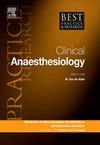回归预期的肿瘤治疗:定义、围手术期预后因素和干预措施
IF 2.8
3区 医学
Q1 ANESTHESIOLOGY
Best Practice & Research-Clinical Anaesthesiology
Pub Date : 2025-03-01
DOI:10.1016/j.bpa.2025.03.009
引用次数: 0
摘要
在癌症生存之旅中,许多患者需要内科和外科肿瘤治疗来提高生存率。回归预期肿瘤治疗(RIOT)是一个相对较新的概念,涉及癌症手术后治疗的连续性。虽然已经公布了一般定义,但阈值和最小临床重要差异(MCID)尚未标准化。对于许多癌症,延迟RIOT的阈值为6-8周,而结直肠癌的MCID可能接近4周。针对RIOT的研究表明,多种人口统计学、社会经济、制度、手术和术后因素与RIOT的发生率和时间差异有关。这些变量中影响最大的是手术入路。虽然对RIOT术后增强恢复效果的研究有所增加,但文献仍处于早期阶段。最后,麻醉干预对RIOT的影响在很大程度上尚未被探索。本文章由计算机程序翻译,如有差异,请以英文原文为准。
Return to intended oncologic treatment: Definitions, perioperative prognostic factors, and interventions
In the cancer survivorship journey, many patients require both medical and surgical oncologic treatments to improve survival. The return to intended oncologic treatment (RIOT) is a relatively new concept addressing the continuity of cancer treatment after surgery. While general definitions have been published, thresholds and minimal clinically important differences (MCID) have not been standardised. For many cancers, a threshold for delayed RIOT is 6–8 weeks, while the MCID in colorectal cancer may approximate 4 weeks. Studies addressing RIOT have shown multiple demographics, socioeconomic, institutional, surgical, and postoperative factors associated with a difference in rate and time to RIOT. The most influential of these variables is the surgical approach. While research on the effect of enhanced recovery after surgery on RIOT has increased, the literature is still in its early stages. Finally, the effect of anaesthetic interventions on RIOT has been largely unexplored.
求助全文
通过发布文献求助,成功后即可免费获取论文全文。
去求助
来源期刊

Best Practice & Research-Clinical Anaesthesiology
ANESTHESIOLOGY-
自引率
0.00%
发文量
37
审稿时长
36 days
 求助内容:
求助内容: 应助结果提醒方式:
应助结果提醒方式:


